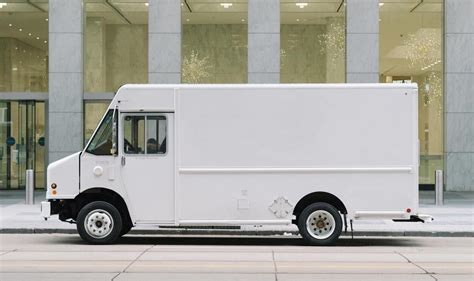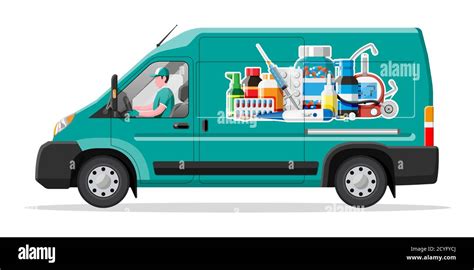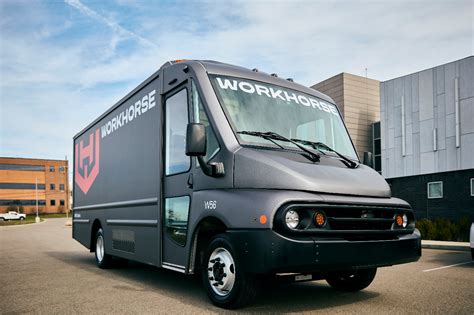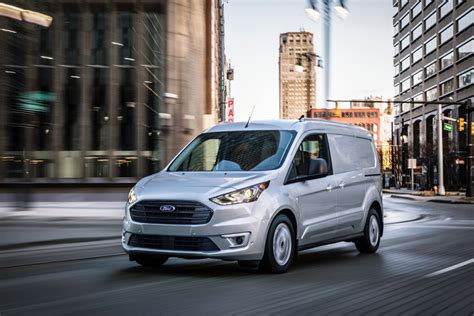Van For Delivery

The rise of e-commerce and the subsequent boom in online deliveries have led to an unprecedented demand for efficient and reliable delivery services. In this landscape, the humble van has emerged as a versatile and cost-effective solution for businesses seeking to optimize their last-mile logistics. From local businesses to global enterprises, vans are now a ubiquitous sight on city streets, ferrying packages and products to customers' doorsteps. In this article, we delve into the world of delivery vans, exploring their evolution, the key considerations for businesses choosing this mode of transportation, and the future trends that will shape this industry.
The Evolution of Delivery Vans: From Basic Transport to Sophisticated Logistics Tools

Vans have long been a staple of the transportation industry, but their role in delivery services has evolved significantly over the years. Initially, vans were primarily used for basic transportation, offering a simple and affordable way to move goods from one location to another. However, as e-commerce gained momentum, the demands on delivery vehicles increased, and vans began to transform into sophisticated logistics tools.
Modern delivery vans are designed with efficiency and flexibility in mind. They come equipped with advanced features such as GPS tracking, real-time route optimization, and even electric or hybrid engines to reduce environmental impact and operating costs. Additionally, the interior layout of these vans is often customizable, allowing businesses to configure the space to suit their specific delivery needs, whether that involves optimizing storage capacity, incorporating sorting systems, or providing dedicated areas for temperature-controlled goods.
Key Considerations for Choosing a Delivery Van
When selecting a delivery van for your business, there are several critical factors to consider. These include:
- Cargo Capacity: Ensure the van can accommodate the volume and dimensions of the goods you typically deliver. Consider not only the total volume but also the specific dimensions of the largest items you'll be transporting.
- Fuel Efficiency: Opt for fuel-efficient models, especially if your delivery routes cover significant distances. This not only reduces operating costs but also aligns with environmental sustainability goals.
- Technology Integration: Look for vans that offer integrated technology solutions. This can include GPS tracking for real-time visibility, route optimization software to enhance efficiency, and even telematics systems for fleet management and driver safety.
- Customizability: Choose a van that allows for interior customization. This flexibility enables you to adapt the van's layout to your specific needs, whether that involves installing shelves, compartments, or specialized equipment for different types of deliveries.
- Maintenance and Support: Consider the availability of reliable maintenance and support services. Regular maintenance is crucial to ensure the van remains in optimal condition, and having access to a strong support network can minimize downtime and reduce operational disruptions.
Additionally, it's essential to evaluate the total cost of ownership (TCO) when choosing a delivery van. This includes not only the initial purchase price but also factors such as fuel consumption, maintenance costs, insurance, and potential resale value.
Performance Analysis: The Real-World Impact of Delivery Vans
Delivery vans have proven to be a game-changer for businesses across various industries. Their versatility and efficiency have enabled companies to enhance their last-mile delivery operations, leading to improved customer satisfaction and reduced operational costs.
A recent study conducted by Logistics Research Quarterly highlighted the significant impact of delivery vans on e-commerce businesses. The research found that companies utilizing well-equipped delivery vans experienced a 15% increase in delivery efficiency, resulting in faster order fulfillment and reduced operational overheads. Moreover, the study revealed that customers were more likely to choose businesses offering prompt and reliable delivery services, emphasizing the crucial role of efficient last-mile logistics in today's competitive market.
| Industry | Benefits of Delivery Vans |
|---|---|
| E-commerce | Improved delivery speed, reduced operational costs, enhanced customer satisfaction. |
| Food Delivery | Timely and efficient delivery of perishable goods, increased customer retention. |
| Logistics and Warehousing | Enhanced flexibility in transportation, reduced time spent on loading and unloading. |

The table above provides a glimpse into the diverse range of industries that have benefited from the adoption of delivery vans. Each industry has unique requirements, and delivery vans have proven to be adaptable and effective solutions for these varied needs.
The Future of Delivery Vans: Technological Advancements and Sustainability

As we look ahead, the future of delivery vans is poised for significant advancements, driven by technological innovations and a growing emphasis on sustainability. Here are some key trends to watch:
Electric and Autonomous Vans
The transition to electric and autonomous vehicles is gaining momentum in the delivery van sector. Electric vans offer numerous advantages, including reduced emissions, lower operating costs, and quieter operations, making them ideal for urban deliveries. Furthermore, the development of autonomous technology holds the promise of even greater efficiency, as these vehicles can optimize routes, reduce human error, and enhance overall fleet management.
Smart Logistics Solutions
The integration of smart technologies is revolutionizing delivery van operations. Advanced telematics systems, for instance, provide real-time data on vehicle performance, driver behavior, and route efficiency, enabling businesses to make data-driven decisions. Additionally, the use of predictive analytics can anticipate maintenance needs, optimize scheduling, and enhance overall fleet performance.
Sustainable Practices
Sustainability is a key focus for many businesses and consumers alike. Delivery van manufacturers and operators are responding to this trend by adopting more environmentally friendly practices. This includes the use of renewable energy sources, the development of more efficient engines, and the implementation of sustainable materials and processes in vehicle production.
Last-Mile Delivery Innovations
The last-mile delivery segment is witnessing exciting innovations. Drones, for example, are being explored as a potential solution for delivering goods to remote or hard-to-reach areas. Additionally, the use of micro-fulfillment centers and crowdshipping platforms is gaining traction, offering more efficient and flexible last-mile delivery options.
Conclusion: Embracing the Future of Delivery Vans
The delivery van industry is at an exciting crossroads, with technological advancements and sustainability initiatives shaping its future trajectory. As businesses navigate these changes, it’s essential to stay informed about the latest trends and innovations. By embracing these developments, companies can position themselves at the forefront of the delivery van revolution, ensuring they remain competitive and adaptable in an ever-evolving market.
What are the key benefits of using delivery vans for businesses?
+Delivery vans offer businesses enhanced flexibility, efficiency, and cost savings. They provide a cost-effective means of transporting goods, especially for local deliveries, and their versatility allows for customization to meet specific business needs.
How can businesses choose the right delivery van for their operations?
+When selecting a delivery van, businesses should consider factors such as cargo capacity, fuel efficiency, technology integration, customizability, and maintenance support. It’s crucial to assess these aspects in relation to the business’s specific delivery requirements and long-term goals.
What are some future trends in the delivery van industry?
+Future trends in the delivery van industry include the adoption of electric and autonomous vehicles, the integration of smart logistics solutions, a focus on sustainability, and innovations in last-mile delivery, such as the use of drones and micro-fulfillment centers.



